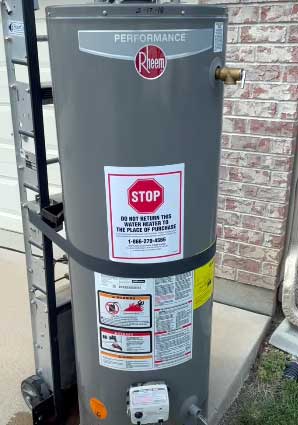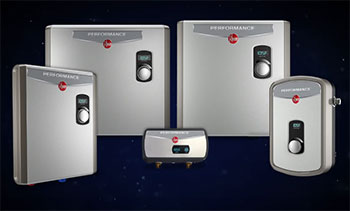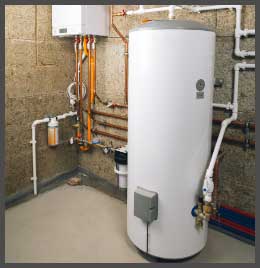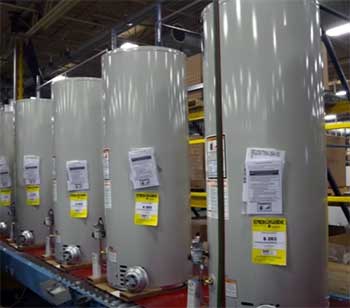If you’re looking for a dependable water heater that balances performance, lifespan, and budget, comparing Rheem and Reliance is a smart move.
I’ve used both brands in different homes, and this article will walk you through real-life experiences, feature-by-feature insights, and honest pros and cons.
By the end, you’ll know which one fits your needs better and why you might choose one over the other for your household hot water demands.
Quick Comparison Table: Rheem Vs. Reliance Water Heaters
| Feature | Rheem Water Heaters | Reliance Water Heaters |
| Brand Owner | Rheem Manufacturing | Owned by Rheem since acquisition |
| Range of Models | Gas, electric, tank, tankless, hybrid | Primarily electric tank models |
| Energy Efficiency | High-efficiency condensing and hybrid lines | Standard electric models |
| Warranty | 6 to 12 years on tank, up to 5 on parts | Typically 8 years on tank, 3 years on parts |
| Price Range | Mid to high | Budget-friendly |
| Flow Rate / Hot Water Output | Variable—strong on high-demand setups | Adequate for small-to-medium households |
| Installation Ease | Professional recommended for gas/tankless | Often DIY‑friendly electric installs |
| Build Quality | Premium components | Basic, reliable design |
| Availability and Service | Widely available, strong service network | Good availability in major retailers |
| Smart or Digital Features | Available in select models | Mostly basic mechanical controls |
My Experience with Rheem and Reliance Water Heaters

I’ve lived through both brands firsthand.
In my first apartment, I installed a Reliance electric tank water heater.
It was affordable, easy to install myself, and delivered reliable hot water for my needs.
Setting it to 120°F and flushing it annually kept it working well through the first five years.
I wasn’t worried about power outages or complex installations—it just worked.
Later, when I moved to a larger house with gas lines installed, I decided to try a Rheem Performance Platinum gas heater.
Right from the first shower, I noticed a significant difference—on-demand hot water, stronger flow, and no waiting around for the tank to refill.
The unit delivered consistent temperatures and handled multiple showers, laundry, and dishes simultaneously without a hitch.
One of the biggest advantages I saw with Rheem was the energy-saving condensing model I installed.
My monthly gas bills dropped, especially when compared to my previous reliance on electric heaters.
The digital reset controls and diagnostic readouts were a bonus—simple to use yet powerful.
In contrast, Reliance’s electric model felt more basic.
No diagnostics, no fancy control panel—just a dial and an indicator light.
Even so, reliability was solid.
I replaced one of its heating elements only once after several years, and the rest of the system ran quietly and consistently.
Over the course of using both brands, I came to appreciate what each offers.
Rheem delivered higher performance and energy savings in larger homes but required professional installation and occasional service complications due to venting or gas lines.
Reliance was simple, predictable, and cheaper—perfect for small homes, rental units, or as a secondary heater.
Pros and Cons of Rheem and Reliance Water Heaters

Pros of Rheem Water Heaters:
- High efficiency ratings: Many Rheem models—especially the hybrid and condensing ones—are ENERGY STAR® certified, which can help lower your monthly utility bills significantly over time.
- Advanced features: Rheem offers smart Wi-Fi connected models that let you adjust settings remotely, monitor usage, and receive alerts if something goes wrong.
- Variety of options: Whether you’re looking for gas, electric, tank, or tankless, Rheem has a wide range of choices to fit almost every type of home setup and water demand.
- Strong hot water output: In my experience, Rheem heaters handle multiple uses at once—like showering and laundry—without fluctuations in temperature.
- Robust build quality: Rheem heaters often use brass fittings, stainless steel elements, and thicker anode rods, which add to their durability and reliability.
Cons of Rheem Water Heaters:
- Higher upfront cost: Compared to Reliance, Rheem heaters—especially their advanced models—tend to be more expensive both in terms of purchase and installation.
- Complex installation for gas models: Unless you’re experienced, gas and condensing units may require a licensed plumber, which adds to the setup cost.
- Sensitive digital components: While the digital control panel is a great tool, it can occasionally show false alerts or need a system reset.
- Parts availability can vary: Some users report waiting for specific parts when repairs are needed, especially in rural areas or smaller towns.
- More maintenance required: To keep Rheem’s high-efficiency systems running optimally, regular flushing and vent cleaning are more critical.
Pros and Cons of Reliance Water Heaters:

Pros of Reliance Water Heaters:
- Budget-friendly: Reliance is generally more affordable than Rheem, making it a great option if you’re upgrading on a tight budget or outfitting a rental property.
- Easy to install: Most Reliance models, especially electric ones, are DIY-friendly and come with straightforward instructions.
- Decent reliability: While they’re simpler units, they tend to run well for years with minimal maintenance when used properly.
- Readily available: You’ll often find Reliance heaters in major home improvement stores, meaning faster access to units and replacement parts.
- Solid warranty coverage: Some models come with up to 9 years of tank warranty, giving you peace of mind without the extra premium.
Cons of Reliance Water Heaters:
- Basic controls: You won’t get advanced features like Wi-Fi, digital diagnostics, or adjustable cycles—most settings are manual and basic.
- Less efficient: Standard electric tank heaters from Reliance don’t offer the same energy savings as a hybrid or tankless system from Rheem.
- Slower recovery: If your household uses a lot of hot water at once, you might experience slower heating or need to wait longer between showers.
- Limited range: Reliance focuses primarily on basic electric models, so you have fewer options compared to Rheem’s extensive catalog.
- Shorter lifespan for some models: Some users report issues developing after the 5-7 year mark, especially with lower-end models or if not regularly maintained.
Maintenance Tips for Rheem and Reliance Water Heaters
Maintaining either Rheem or Reliance water heaters doesn’t have to be a hassle, but it’s essential if you want long-term performance and reliability.
- Flushing the tank annually: Sediment buildup is the biggest killer of water heater performance, especially for tank models. Once a year, drain a few gallons from the bottom of the tank and flush it fully to remove mineral deposits.
- Check the anode rod every 2–3 years: This internal rod helps prevent tank corrosion. If it looks corroded or under ½ inch thick, replace it. This is especially important for Rheem models, which use more premium materials that can last longer if maintained.
- Inspect temperature settings: Keeping the thermostat around 120°F protects your heater and prevents scalding. Reliance models use a dial system, while Rheem lets you fine-tune with digital controls. Just check periodically to ensure it hasn’t been bumped or changed.
- Clean air intake and vents (for gas units): Rheem gas heaters may need occasional cleaning of the intake filters or venting. Dust or debris can affect combustion and efficiency.
- Replace filters and cartridges: Some Rheem units come with washable air filters or water treatment cartridges that need cleaning or replacing to keep everything working properly.
- Test the TPR (Temperature Pressure Relief) valve: Open the valve lever briefly once a year to ensure it’s not stuck. This prevents dangerous pressure buildup and is a key safety feature.
- Check for leaks or rust marks: Small leaks or corrosion spots should be addressed immediately. On older tanks, these can lead to full breakdowns if ignored.
- Listen for noises: Rumbling or popping sounds usually indicate sediment buildup. Don’t ignore it—it’s time to flush or call for service.
- Schedule professional inspection every 3–5 years: Even if your unit seems fine, a technician can spot early issues, flush the unit thoroughly, and replace small parts before they become costly problems.
Rheem Vs. Other Brands
- Rheem Vs. AO Smith
Having tested both Rheem and AO Smith water heaters, I found Rheem to be more innovative when it comes to energy efficiency and technology integration.
AO Smith, on the other hand, is known for its robust, long-lasting tanks and excellent warranties, especially on their ProLine series.
But where Rheem pulls ahead is with their Wi-Fi-enabled smart models and ultra-quiet operation.
AO Smith units are slightly easier to install and maintain, especially for beginners, but Rheem offers more control and smarter features.
If you’re looking for high-tech water management, I’d lean toward Rheem.
For sheer durability and ease of use, AO Smith is a solid pick.
- Rheem Vs. Bradford White

In my experience, Bradford White heaters are better known among professionals and require licensed installers, which might be a hurdle for homeowners who want a DIY approach.
Rheem is far more accessible—you can pick it up at major retailers and handle basic installs yourself if you’re comfortable.
Performance-wise, Bradford White delivers dependable results and longevity, especially with its Vitraglas tank lining.
But Rheem outperforms when it comes to energy savings and user features.
For anyone who values modern convenience and remote control, Rheem offers more flexibility.
For those looking for a purely rugged build, Bradford White wins on simplicity and toughness.
- Rheem Vs. Navien
Navien is a top-tier choice if you’re looking specifically at tankless systems.
I’ve installed both brands and can say Navien is all about premium build and performance, but it’s also more expensive and complex.
Rheem’s tankless lineup is more budget-friendly and beginner-friendly, and still performs well for a small to medium household.
Navien units require more involved maintenance and professional installation, but they’re whisper-quiet and great for high-demand setups.
Rheem is easier to manage, especially if you’re not trying to get too technical.
If you’re tech-savvy and willing to spend more, Navien shines—but Rheem offers excellent value and reliability for less.
- Rheem Vs. State
State water heaters are reliable, no-frills workhorses.
They’re commonly found in rental properties and smaller homes because they’re simple, affordable, and just get the job done.
I had a State electric heater in one of my older apartments—it was solid, but limited in efficiency and speed.
Rheem offers a noticeable upgrade in smart functionality and energy savings.
Plus, their tankless models deliver hot water faster with fewer temperature fluctuations.
State might be okay if you’re on a strict budget or don’t need advanced features.
But if you want something future-proof with smarter controls, Rheem feels more premium.
- Rheem Vs. Reliance
Reliance is great for cost-conscious shoppers who want straightforward hot water without paying extra for bells and whistles.
Their heaters are easy to find, easy to install, and mostly problem-free for basic use.
That said, Rheem’s units are miles ahead in terms of energy efficiency, advanced controls, and long-term savings.
I used Reliance in a vacation cabin and it worked fine, but back at home, Rheem’s smart model saved money and gave better hot water consistency.
If you’re just covering basic needs, Reliance does the job.
But for more robust usage and features, Rheem is a better investment.
Frequently Asked Questions (FAQs)
Rheem is widely considered one of the most reliable water heater brands due to its balance of performance, innovation, and durability. However, brands like AO Smith and Bradford White also hold strong reputations for long-lasting units.
The most common issue reported with Rheem heaters is thermostat malfunction or sediment buildup in the tank. These are generally easy to fix and prevent with routine maintenance.
Reliance water heaters are manufactured by American Water Heater Company, which is owned by A.O. Smith. So, you’re essentially getting AO Smith engineering at a budget-friendly price.
Reliance heaters typically last between 8 to 12 years with regular maintenance. Their lifespan depends heavily on water quality, usage, and whether routine care is followed.
Final Thoughts
If you’re comparing Rheem and Reliance to figure out which water heater is right for your home, it comes down to what you value most.
You want a system that’s reliable, energy-efficient, and smart enough to fit into modern life.
Rheem brings all that and more.
While Reliance works for basic needs, Rheem truly gives you more comfort, control, and cost savings in the long run.
As someone who’s used both, I’d confidently recommend Rheem if you want a worry-free water heating experience that adapts to your lifestyle.
